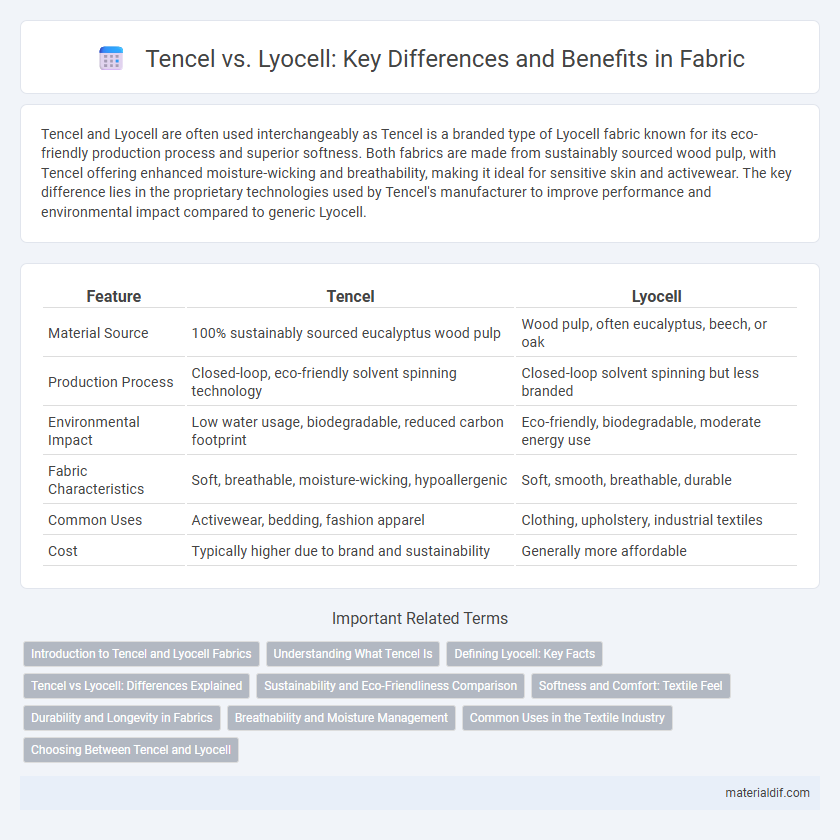Tencel and Lyocell are often used interchangeably as Tencel is a branded type of Lyocell fabric known for its eco-friendly production process and superior softness. Both fabrics are made from sustainably sourced wood pulp, with Tencel offering enhanced moisture-wicking and breathability, making it ideal for sensitive skin and activewear. The key difference lies in the proprietary technologies used by Tencel's manufacturer to improve performance and environmental impact compared to generic Lyocell.
Table of Comparison
| Feature | Tencel | Lyocell |
|---|---|---|
| Material Source | 100% sustainably sourced eucalyptus wood pulp | Wood pulp, often eucalyptus, beech, or oak |
| Production Process | Closed-loop, eco-friendly solvent spinning technology | Closed-loop solvent spinning but less branded |
| Environmental Impact | Low water usage, biodegradable, reduced carbon footprint | Eco-friendly, biodegradable, moderate energy use |
| Fabric Characteristics | Soft, breathable, moisture-wicking, hypoallergenic | Soft, smooth, breathable, durable |
| Common Uses | Activewear, bedding, fashion apparel | Clothing, upholstery, industrial textiles |
| Cost | Typically higher due to brand and sustainability | Generally more affordable |
Introduction to Tencel and Lyocell Fabrics
Tencel is a branded form of lyocell fabric made from sustainably sourced eucalyptus wood pulp through an environmentally friendly closed-loop process. Lyocell fabrics, including Tencel, are known for their exceptional softness, moisture-wicking properties, and durability, making them popular in eco-conscious fashion and home textiles. Both fabrics offer breathability and biodegradability, positioning them as superior alternatives to traditional synthetic fibers.
Understanding What Tencel Is
Tencel is a branded form of lyocell fiber produced by Lenzing AG, known for its sustainable and eco-friendly manufacturing process that uses biodegradable solvents in closed-loop systems. It offers superior softness, moisture-wicking properties, and breathability compared to conventional fibers, making it ideal for apparel and home textiles. Tencel's cellulosic nature derived from sustainably sourced wood pulp ensures durability, biodegradability, and reduced environmental impact.
Defining Lyocell: Key Facts
Lyocell is a sustainable cellulose fiber derived from wood pulp, primarily sourced from eucalyptus, beech, and spruce trees. It is produced through a closed-loop process that recycles water and solvents, minimizing environmental impact. Known for its softness, breathability, and moisture-wicking properties, Lyocell is commonly used in eco-friendly textiles and apparel.
Tencel vs Lyocell: Differences Explained
Tencel and Lyocell are terms often used interchangeably, but Tencel is a branded type of Lyocell fabric produced through an eco-friendly closed-loop process by Lenzing AG. Tencel fibers are known for superior softness, breathability, and moisture-wicking properties compared to generic Lyocell, which may vary in production methods and fabric quality. Both fabrics are biodegradable and made from sustainable wood pulp, but Tencel's patented production ensures enhanced durability and reduced environmental impact.
Sustainability and Eco-Friendliness Comparison
Tencel and Lyocell are both sustainable fabrics derived from wood pulp, with Tencel being a branded type of Lyocell produced by Lenzing AG using a closed-loop production process that recycles water and solvents, minimizing environmental impact. Lyocell fibers are biodegradable and require fewer chemicals and less water compared to conventional cotton, making both fabrics eco-friendly options in the textile industry. The sustainability advantage of Tencel lies in its certified responsible wood sourcing from sustainably managed forests, enhancing its appeal for environmentally conscious consumers.
Softness and Comfort: Textile Feel
Tencel and Lyocell fabrics are both renowned for their exceptional softness and comfort, derived from their cellulose-based fibers. Tencel, produced by Lenzing AG, typically offers a smoother, silkier texture with excellent moisture-wicking properties, enhancing breathability and skin comfort. Lyocell, often used interchangeably with Tencel, shares similar softness but may vary slightly in textile feel depending on manufacturing processes and fiber blends.
Durability and Longevity in Fabrics
Tencel and Lyocell fabrics are both made from sustainably sourced wood pulp, offering exceptional durability and longevity. Tencel fibers have enhanced strength and resistance to wear, making them ideal for long-lasting garments, while Lyocell also provides excellent tensile strength with added moisture-wicking properties. Both fabrics maintain their integrity after multiple washes, ensuring prolonged fabric life and sustained comfort.
Breathability and Moisture Management
Tencel and Lyocell fabrics both excel in breathability due to their smooth fiber structure, which promotes airflow and keeps the skin cool. Tencel, a branded form of Lyocell, is known for superior moisture management, absorbing moisture efficiently and releasing it quickly to maintain dryness and comfort. Both fabrics are biodegradable and derived from sustainable wood sources, making them ideal for eco-conscious textile choices focused on performance in moisture control and ventilation.
Common Uses in the Textile Industry
Tencel and Lyocell fabrics are widely used in the textile industry for their sustainability and comfort, commonly found in apparel such as activewear, casual wear, and intimate clothing. Both fibers are favored for bedding products like sheets and pillowcases due to their moisture-wicking and breathable properties. Tencel, a branded form of Lyocell produced by Lenzing, is often preferred in high-end fashion and eco-friendly textiles for its superior softness and environmental benefits.
Choosing Between Tencel and Lyocell
Choosing between Tencel and Lyocell depends on the specific fabric quality and environmental impact preferences, as both are forms of rayon made from wood pulp. Tencel, a branded version of Lyocell produced by Lenzing AG, is known for its superior softness, breathability, and moisture-wicking properties, making it ideal for sensitive skin and activewear. Lyocell fabrics, while similar, can vary in production methods and certifications, so selecting certified sustainable Lyocell ensures eco-friendly benefits comparable to Tencel.
Tencel vs Lyocell Infographic

 materialdif.com
materialdif.com